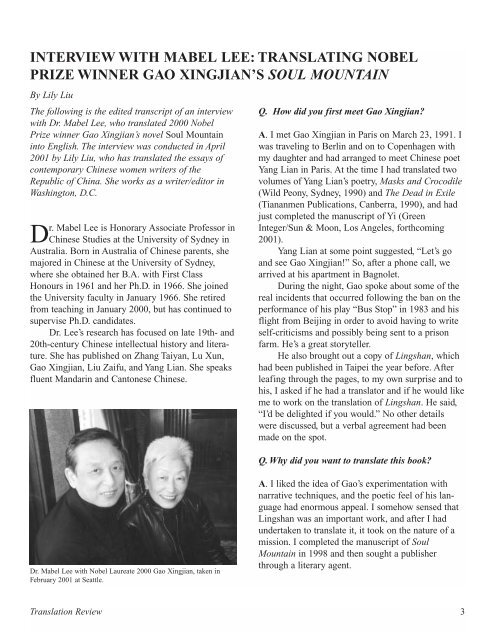Translation Review - The University of Texas at Dallas
Translation Review - The University of Texas at Dallas
Translation Review - The University of Texas at Dallas
You also want an ePaper? Increase the reach of your titles
YUMPU automatically turns print PDFs into web optimized ePapers that Google loves.
INTERVIEW WITH MABEL LEE: TRANSLATING NOBEL<br />
PRIZE WINNER GAO XINGJIAN’S SOUL MOUNTAIN<br />
By Lily Liu<br />
<strong>The</strong> following is the edited transcript <strong>of</strong> an interview<br />
with Dr. Mabel Lee, who transl<strong>at</strong>ed 2000 Nobel<br />
Prize winner Gao Xingjian’s novel Soul Mountain<br />
into English. <strong>The</strong> interview was conducted in April<br />
2001 by Lily Liu, who has transl<strong>at</strong>ed the essays <strong>of</strong><br />
contemporary Chinese women writers <strong>of</strong> the<br />
Republic <strong>of</strong> China. She works as a writer/editor in<br />
Washington, D.C.<br />
Dr. Mabel Lee is Honorary Associ<strong>at</strong>e Pr<strong>of</strong>essor in<br />
Chinese Studies <strong>at</strong> the <strong>University</strong> <strong>of</strong> Sydney in<br />
Australia. Born in Australia <strong>of</strong> Chinese parents, she<br />
majored in Chinese <strong>at</strong> the <strong>University</strong> <strong>of</strong> Sydney,<br />
where she obtained her B.A. with First Class<br />
Honours in 1961 and her Ph.D. in 1966. She joined<br />
the <strong>University</strong> faculty in January 1966. She retired<br />
from teaching in January 2000, but has continued to<br />
supervise Ph.D. candid<strong>at</strong>es.<br />
Dr. Lee’s research has focused on l<strong>at</strong>e 19th- and<br />
20th-century Chinese intellectual history and liter<strong>at</strong>ure.<br />
She has published on Zhang Taiyan, Lu Xun,<br />
Gao Xingjian, Liu Zaifu, and Yang Lian. She speaks<br />
fluent Mandarin and Cantonese Chinese.<br />
Dr. Mabel Lee with Nobel Laure<strong>at</strong>e 2000 Gao Xingjian, taken in<br />
February 2001 <strong>at</strong> Se<strong>at</strong>tle.<br />
Q. How did you first meet Gao Xingjian?<br />
A. I met Gao Xingjian in Paris on March 23, 1991. I<br />
was traveling to Berlin and on to Copenhagen with<br />
my daughter and had arranged to meet Chinese poet<br />
Yang Lian in Paris. At the time I had transl<strong>at</strong>ed two<br />
volumes <strong>of</strong> Yang Lian’s poetry, Masks and Crocodile<br />
(Wild Peony, Sydney, 1990) and <strong>The</strong> Dead in Exile<br />
(Tiananmen Public<strong>at</strong>ions, Canberra, 1990), and had<br />
just completed the manuscript <strong>of</strong> Yi (Green<br />
Integer/Sun & Moon, Los Angeles, forthcoming<br />
2001).<br />
Yang Lian <strong>at</strong> some point suggested, “Let’s go<br />
and see Gao Xingjian!” So, after a phone call, we<br />
arrived <strong>at</strong> his apartment in Bagnolet.<br />
During the night, Gao spoke about some <strong>of</strong> the<br />
real incidents th<strong>at</strong> occurred following the ban on the<br />
performance <strong>of</strong> his play “Bus Stop” in 1983 and his<br />
flight from Beijing in order to avoid having to write<br />
self-criticisms and possibly being sent to a prison<br />
farm. He’s a gre<strong>at</strong> storyteller.<br />
He also brought out a copy <strong>of</strong> Lingshan, which<br />
had been published in Taipei the year before. After<br />
leafing through the pages, to my own surprise and to<br />
his, I asked if he had a transl<strong>at</strong>or and if he would like<br />
me to work on the transl<strong>at</strong>ion <strong>of</strong> Lingshan. He said,<br />
“I’d be delighted if you would.” No other details<br />
were discussed, but a verbal agreement had been<br />
made on the spot.<br />
Q. Why did you want to transl<strong>at</strong>e this book?<br />
A. I liked the idea <strong>of</strong> Gao’s experiment<strong>at</strong>ion with<br />
narr<strong>at</strong>ive techniques, and the poetic feel <strong>of</strong> his language<br />
had enormous appeal. I somehow sensed th<strong>at</strong><br />
Lingshan was an important work, and after I had<br />
undertaken to transl<strong>at</strong>e it, it took on the n<strong>at</strong>ure <strong>of</strong> a<br />
mission. I completed the manuscript <strong>of</strong> Soul<br />
Mountain in 1998 and then sought a publisher<br />
through a literary agent.<br />
<strong>Transl<strong>at</strong>ion</strong> <strong>Review</strong> 3

















